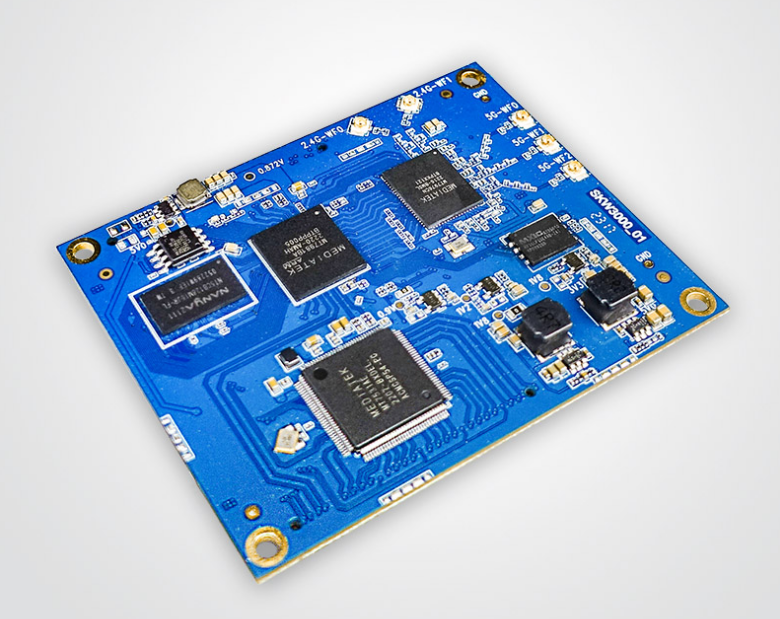Although both Bluetooth and WiFi modules are wireless communication modules, Bluetooth transmission is slow, short distance, and low power consumption, making it suitable for short distance, low-power small data transmission scenarios; WiFi has fast transmission, wide coverage, and can connect multiple devices, making it suitable for high-speed big data transmission and wide area networking scenarios. You can choose according to your needs.

Comparison between Bluetooth module and WiFi module:
Bluetooth module: The transmission speed is relatively slow. The maximum speed of Bluetooth 3.0, 4.0, and 5.0 is around 24Mbps, while the theoretical speed of Bluetooth 5.0 can reach 50Mbps. In practical applications, the transmission speed may be reduced due to environmental factors.
WiFi module: The transmission speed is usually fast, such as up to 11Mbps for IEEE802.11b, 54Mbps for IEEE802.11a, and 54Mbps for IEEE802.11g. WiFi using the IEEE802.11ac standard can reach speeds ranging from several hundred Mbps to 1Gbps, and the more advanced WiFi6 (802.11ax) standard can theoretically reach a maximum speed of up to 9.6Gbps.
Bluetooth module: It belongs to wireless personal area networks, and the signal range is usually limited to a few meters to tens of meters. The effective transmission distance is generally around 10 meters, and even in Bluetooth mesh networking, the transmission distance is far less than WiFi.
WiFi module: belongs to wireless LAN, with a large signal coverage range, which can cover the entire home or office. Generally, wireless routers can cover a radius of tens or even hundreds of meters in an accessible environment.
Bluetooth module: With low power consumption, especially the application of low-power Bluetooth (BLE) technology, it performs well in battery powered devices such as smart wearables, effectively extending the device's usage time.
WiFi module: It has relatively high power consumption and requires continuous power supply to maintain network connectivity. For some battery powered mobile devices, prolonged use of the WiFi module can have a significant impact on battery life.
Bluetooth module: using frequency hopping technology, security authentication technology, etc., the security is relatively high, and the signal is more difficult to intercept or interfere with, which can ensure that the connected device is legitimate. However, in recent years, some security vulnerabilities have also been exposed.
WiFi module: It uses a fixed frequency signal that is relatively easy to intercept or interfere with. Although there are various encryption methods such as WEP, WPA, WPA2, WPA3, etc., if the password setting is too simple or there are network vulnerabilities, there may still be security risks.
Bluetooth module: Generally, it can only connect two devices, such as the common connection between mobile phones and headphones. Although Bluetooth mesh technology can achieve networking of multiple devices, in practical applications, the number of connected devices is still relatively small compared to WiFi modules.
WiFi module: It can usually connect multiple devices, and a regular home wireless router can generally connect more than ten or even dozens of devices at the same time, which can meet the needs of multiple devices such as home and office networking.
Bluetooth module: It can be used on various types of devices and has a wide range of compatibility. Almost all smartphones, tablets, audio devices, smart wearables, etc. support Bluetooth function.
WiFi module: Its use depends on whether the device supports WiFi connection. Although most electronic devices are equipped with WiFi function now, there are still some devices that may need to purchase a separate WiFi module for connection, such as some old devices or some simple IoT sensors.
Bluetooth module: relatively low cost, due to its characteristics in power consumption, transmission distance, etc., its hardware design and manufacturing costs are relatively low, and it has advantages in some cost sensitive application scenarios.
WiFi module: With faster transmission speed and higher hardware and technical requirements, its cost is relatively higher. However, with the development of technology and market competition, its cost is gradually decreasing.
Bluetooth module: suitable for scenarios with short distance, low power consumption, small data transmission volume, and high requirements for connection stability, such as smart wearable devices, smart door locks, health and medical equipment, Bluetooth speakers, etc. It is mainly used for point-to-point connection between devices to achieve data transmission and control functions.
WiFi module: suitable for scenarios that require high-speed data transmission, long-distance coverage, and multi device connectivity, such as home networks, office networks, wireless network coverage in public places, as well as remote control and data transmission of smart TVs, network cameras, smart home appliances, and other devices.
Copyrights© Shenzhen Skylab Co.,LTD All Rights Reserved.

